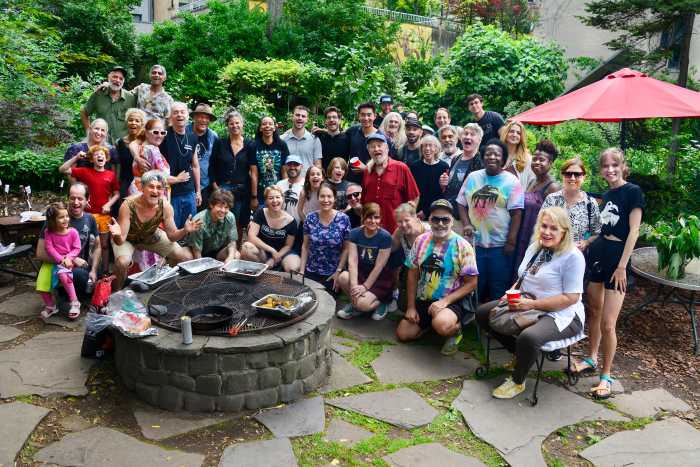By Lara Iden
It was pizza that brought me to Sullivan St.
I was visiting from San Francisco and
starting out on a Hudson Valley daytrip. Sullivan Street Bakery (now called Grandaisy) at 73 Sullivan St. was recommended as a place to pick up a picnic lunch. While my friend got the goods, I waited in the car and took in the lovely, tree-lined street. I was enchanted, and it was to be the start of a beautiful relationship. A few years after moving back East, I found myself back on the block, the new owner of an apartment where I now wake each morning to the aroma of baking bread. That’s the short story of why I joined my neighbors in signing a petition asking the City Planning Commission to deny a proposal to extend commercial zoning to this residential block.
The owner of 73 and 75 Sullivan St. has applied to rezone part of our block for the sole benefit of his properties. The proposal only affects the use of a few buildings and it could have flown under the radar, but two months ago the alert Zoning Committee of Community Board 2 recognized a bad idea when they saw one, and advised against the plan. A recommendation from the borough president echoed the board’s concerns. The City Planning Commission will soon decide.
Grandaisy is a treasure: a vibrant small business with great bread, pizza, and pastry, and like so many small businesses in the neighborhood, it is a center of community life. But this is not about saving a bakery; and even without the rezoning, the property owner can still tear down the bakery to build a new apartment building and turn a nice profit. This is about preserving the very special and highly successful fabric of residential and commercial life in the South Village.
The ability of our block to retain its lively but livable character seems like a miracle. We have busy commercial streets in every direction, but turn south from Spring onto Sullivan and the shift in character is tangible. It is not a miracle. It is the product of successful and appropriate zoning. The proposed change would expose our block to unwanted and destructive change.
Certain streets in the South Village, like Spring and Bleecker, and the parts of Thompson, Sullivan and MacDougal above Houston St., have a “commercial overlay,” meaning that retail stores are allowed. These blocks are attractive, but they are commercial in character and often noisy. The blocks with no overlay, like Thompson, Sullivan and MacDougal Sts. below Houston, are lively but quiet, and clearly residential in character. “Grandfathered” nonconforming commercial uses are allowed but can’t be expanded, so most are tiny shops and neighborhood restaurants, contributing to the old-New York charm that makes this such a popular place to live and visit, but not attracting the crowds and noise that are more typical of nearby streets with commercial zoning. Neighbors are friendly, and residents who have lived here their entire lives provide a strong sense of history and community. Yes, we have stores, but the character is strongly residential.
The Zoning Handbook published by the Department of City Planning says the purpose of commercial overlays is to “serve the local retail needs of the surrounding residential neighborhood… .” It says, “Typical retail uses include grocery stores, restaurants and beauty parlors, [and] cater to the immediate neighborhood.”
The rezoning application for Sullivan St. incorrectly says the proposed change would be a low-impact extension of the commercial overlay. The large modern stores it would allow would be less local than the stores on Spring St. where size and character is limited by the configuration of the old buildings.
The area is already very well served by nearby retail stores, and the likely market for large new stores here is not for businesses serving local needs but for destination retail or restaurants more typical of Broadway and Soho. I hope the City Planning Commission will recognize the proven success of the current zoning. Unlike the outdated manufacturing zoning nearby, the residential zoning on our block is doing its job well. The risks of disrupting the quality of our block with the proposed rezoning are evident, but a public benefit is not.





































